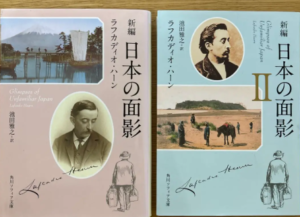皆さんは、小泉八雲という作家がどのようなものを出版したかご存知でしょうか?

Approximately 130 years ago
A Westerner has published a book that introduces the unknown aspects of Japan to the world.
今からおよそ130年前、1人の西洋人が日本の知られざる姿を世界に紹介する本を出版しました。
This work discusses the unique culture and spirituality of ordinary Japanese people, who were not well known in Europe and America at the time.
明治27年(1894)アメリカで出版。「日本人の微笑」など、当時欧米ではよく知られていなかった日本の一般庶民の姿を通じ、その独特な文化や精神性を論じた作品。
彼が残した明治時代の日本の様子について少し記しておきます。

Chapter One My First Day in the Orient
‘Do not fail to write down your first impressions as soon as possible,’ said a kind English
whom I had the pleasure of meeting soon after my arrival in Japan: ‘they are
evanescent, you know; they will never come to you again, once they have faded
out; and yet of all the strange sensations you may receive in this country you
will feel none so charming as these.’ I am trying now to reproduce them from
the hasty notes of the time, and find that they were even more fugitive than
charming; something has evaporated from all my recollections of
them—something impossible to recall. I neglected the friendly advice, in spite
of all resolves to obey it: I could not, in those first weeks, resign myself to
remain indoors and write, while there was yet so much to see and hear and feel
in the sun-steeped ways of the wonderful Japanese city. Still, even could I
revive all the lost sensations of those first experiences, I doubt if I could
express and fix them in words. The first charm of Japan is intangible and
volatile as a perfume.
It began for me with my first kuruma-ride out of the European quarter of
Yokohama into the Japanese town; and so much as I can recall of it is hereafter
set down.
「最初に受けた印象は、出来るだけ早く書き留めておくように」
日本に到着して間もなくお会いした親切なイギリス人教授は私にこう言いました。私は今、当時書き留めたメモからそれらを再現しようとしていますが、その日本の第一印象がどれほど儚くも魅力的だったかに気づかされます。彼のアドバイスを守ろうと決心したにもかかわらず、私はそれを怠ってしまいました。
最初の数週間は日本の素晴らしい街のなかに見るもの・聞くもの・感じるものがあまりにも多かったため、家の中にこもって書く気にはどうしてもなれなかったからです。
もしも、失われた初めての体験の感覚を全て思い出せたとしても、それを言葉でうまく表現できるかはわかりません。それは、横浜の欧米人居住地を出て、日本の街へ向かう人力車の旅から始まりました。
私が思い出せる限りのことをこれからお伝えしようと思います。

Sec. 1
It is with the delicious surprise of the first journey through Japanese
streets—unable to make one’s kuruma-runner understand anything but gestures,
frantic gestures to roll on anywhere, everywhere, since all is unspeakably
pleasurable and new—that one first receives the real sensation of being in the
Orient, in this Far East so much read of, so long dreamed of, yet, as the eyes
bear witness, heretofore all unknown. There is a romance even in the first full
consciousness of this rather commonplace fact; but for me this consciousness is
transfigured inexpressibly by the divine beauty of the day. There is some charm
unutterable in the morning air, cool with the coolness of Japanese spring and
wind-waves from the snowy cone of Fuji; a charm perhaps due rather to softest
lucidity than to any positive tone—an atmospheric limpidity extraordinary,

日本の第一印象
日本の街を初めて人力車で走った時、驚きと感動がありました。人力車を引く車夫には身振り手振りでしか意思を伝えることができず、どこまでも行って欲しいと懸命に合図を送りました。全てが言葉にできないほど楽しく、新鮮でした。その時はじめて、これまで本で読んだり夢に描いてきた東洋、極東の地に自分がいるという実感がわいたのです。
with only a suggestion of blue in it, through which the most distant objects
appear focused with amazing sharpness. The sun is only pleasantly warm; the
jinricksha, or kuruma, is the most cosy little vehicle imaginable; and the streetvistas, as seen above the dancing white mushroom-shaped hat of my sandalled
runner, have an allurement of which I fancy that I could never weary.
Elfish everything seems; for everything as well as everybody is small, and
queer, and mysterious: the little houses under their blue roofs, the little shopfronts hung with blue, and the smiling little people in their blue costumes. The
illusion is only broken by the occasional passing of a tall foreigner, and by
divers shop-signs bearing announcements in absurd attempts at English.
Nevertheless such discords only serve to emphasise reality; they never
materially lessen the fascination of the funny little streets.
‘Tis at first a delightfully odd confusion only, as you look down one of them,
through an interminable flutter of flags and swaying of dark blue drapery, all
made beautiful and mysterious with Japanese or Chinese lettering. For there are
no immediately discernible laws of construction or decoration: each building
seems to have a fantastic prettiness of its own; nothing is exactly like anything
else, and all is bewilderingly novel. But gradually, after an hour passed in the
quarter, the eye begins to recognise in a vague way some general plan in the
construction of these low, light, queerly-gabled wooden houses, mostly
unpainted, with their first stories all open to the street, and thin strips of roofing
sloping above each shop-front, like awnings, back to the miniature balconies of
paper-screened second stories. You begin to understand the common plan of
the tiny shops, with their matted floors well raised above the street level, and
the general perpendicular arrangement of sign-lettering, whether undulating on
drapery or glimmering on gilded and lacquered signboards. You observe that
the same rich dark blue which dominates in popular costume rules also in shop
draperies, though there is a sprinkling of other tints—bright blue and white and
red (no greens or yellows). And then you note also that the dresses of the
labourers are lettered with the same wonderful lettering as the shop draperies.
No arabesques could produce such an effect. As modified for decorative
purposes these ideographs have a speaking symmetry which no design without
a meaning could possess. As they appear on the back of a workman’s
frock—pure white on dark blue—and large enough to be easily read at a great
distance (indicating some guild or company of which the wearer is a member or
employee), they give to the poor cheap garment a fictitious appearance of
splendour.
しかし、私の目に映るのはこれまで全く知らなかった光景でした。全てがまるで妖精のせかいのように感じられます。何もかも、そして誰もが小さくて、どこか神秘的です。青い屋根の小さな家々や青い布がかかった小さな店先、そして青い着物を着て微笑んでいる小さな人々がそう感じさせるのです。その幻想が壊されるのは、たまに背の高い外国人が通り過ぎる時や、変な英語で書かれた看板を見た時だけです。訪れた異国人にとっては古いものが新しく映り、それだけで十分に目を惹きます。
日本の全てが繊細で美しく素晴らしく見えるのです。例えば、小さな絵がかかれた紙袋に入った木の箸。3色の美しい文字が書かれた紙で包まれている桜の木で作られた楊枝の束。そして、人力車の車夫が顔を拭くために使う、飛んでいる雀のデザインが施された空色の手拭いでさえも、そう感じられます。珍しいものや繊細なものがあまりにも多すぎて圧倒されます。どこを見てもまだ理解しきれないほどの素晴らしいものが無数に広がっているのです。しかし、それらを見るのは危険です。見るたびに何かを買わずにはいられなくなるからです。特に、店主が笑顔で次々と商品を見せてくれると、どれもが特別で言葉にできないほど魅力的に感じられて、自分の衝動が怖くなって逃げだしたくなるのです。店主は決して無理に買わせようとはしませんが、品物にはまるで魔法がかかっているかのように一度買い始めたらとまらなくなってしまうのです。安さは破産に導く誘惑にすぎません。魅力的で手頃な価格の品々は尽きることがないのです。太平洋を渡る大きな蒸気船でも、欲しいものをすべてを積むことはできないでしょう。実は欲しいものは店の商品だけではなく、店そのものや店主、通りや街、そして日本全体なのです。富士山や美しい自然、街に住む人々・・・全てが欲しくなるのです。
小泉八雲という人物、130年前の日本にすっかり魅了された方もいらっしゃるのではないでしょうか?
鋭い観察眼で、日本人の接遇や精神を見抜きそれが独特の文化からきている構造ということを独自に紐解きながら述べています。素晴らしい描写は、西洋人の関心を大いにひいた本でした。
小泉八雲の生い立ちが、独自の素晴らしい観察眼と洞察力をもって解き明かしたオリエンタルな世界を表現し得たものということがわかるとより感慨深く拝読できます。
彼は、島根県の松江をはじめとする各地で教鞭をとるかたわら、日本の風習や伝統、そして人々の生活に深く触れ、その魅力を「怪談」などの著作を通じて世界に広く伝えました。彼は日本国籍を取得し日本に永住しました。



コメント